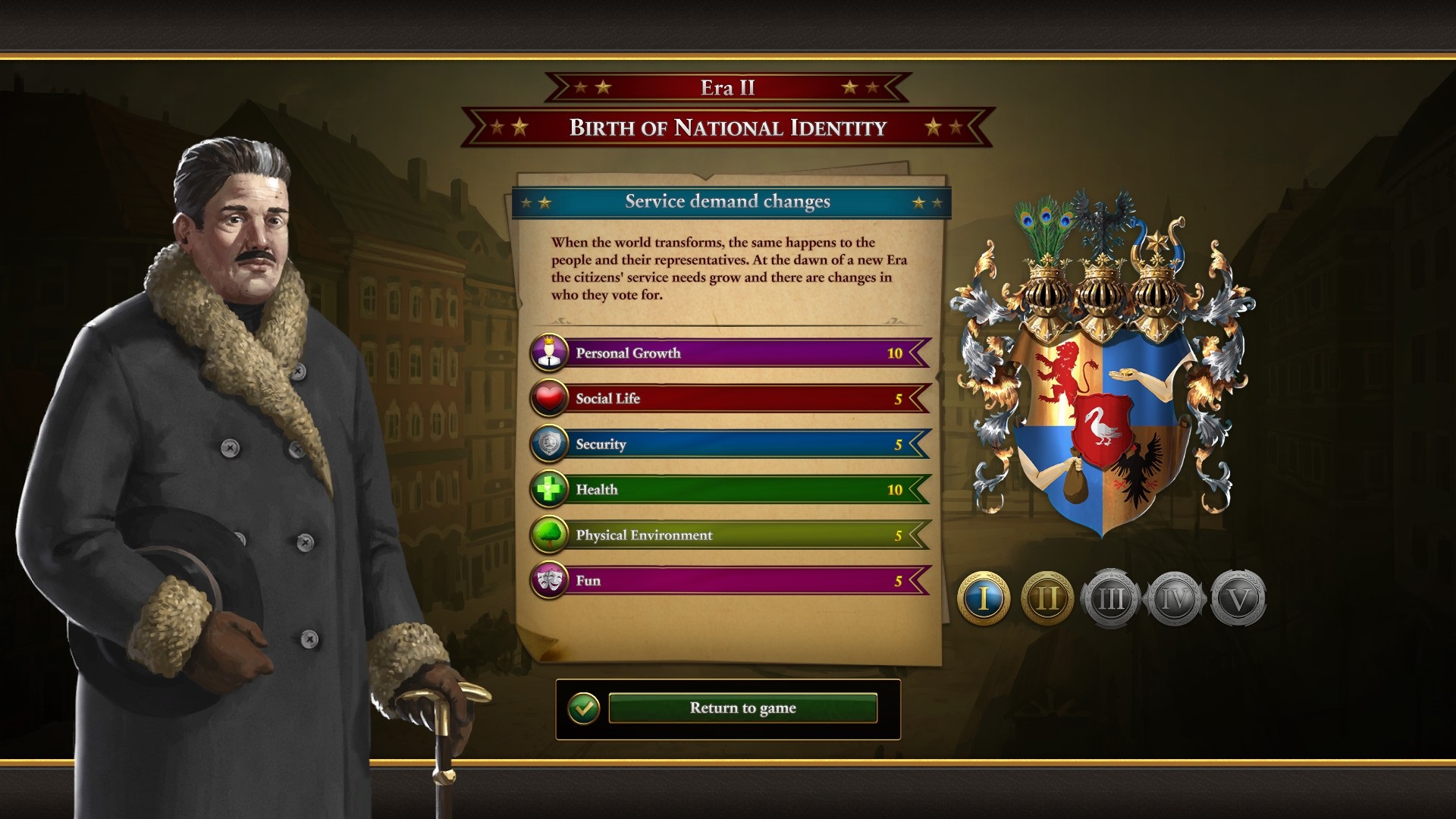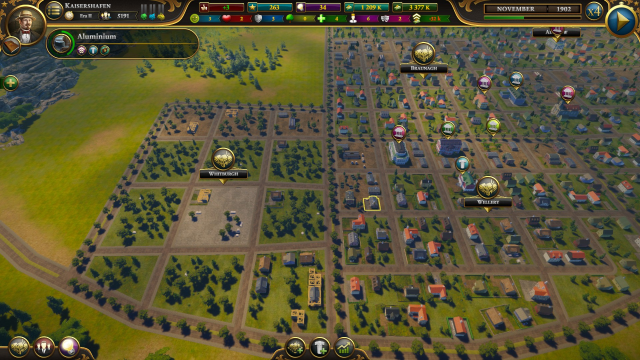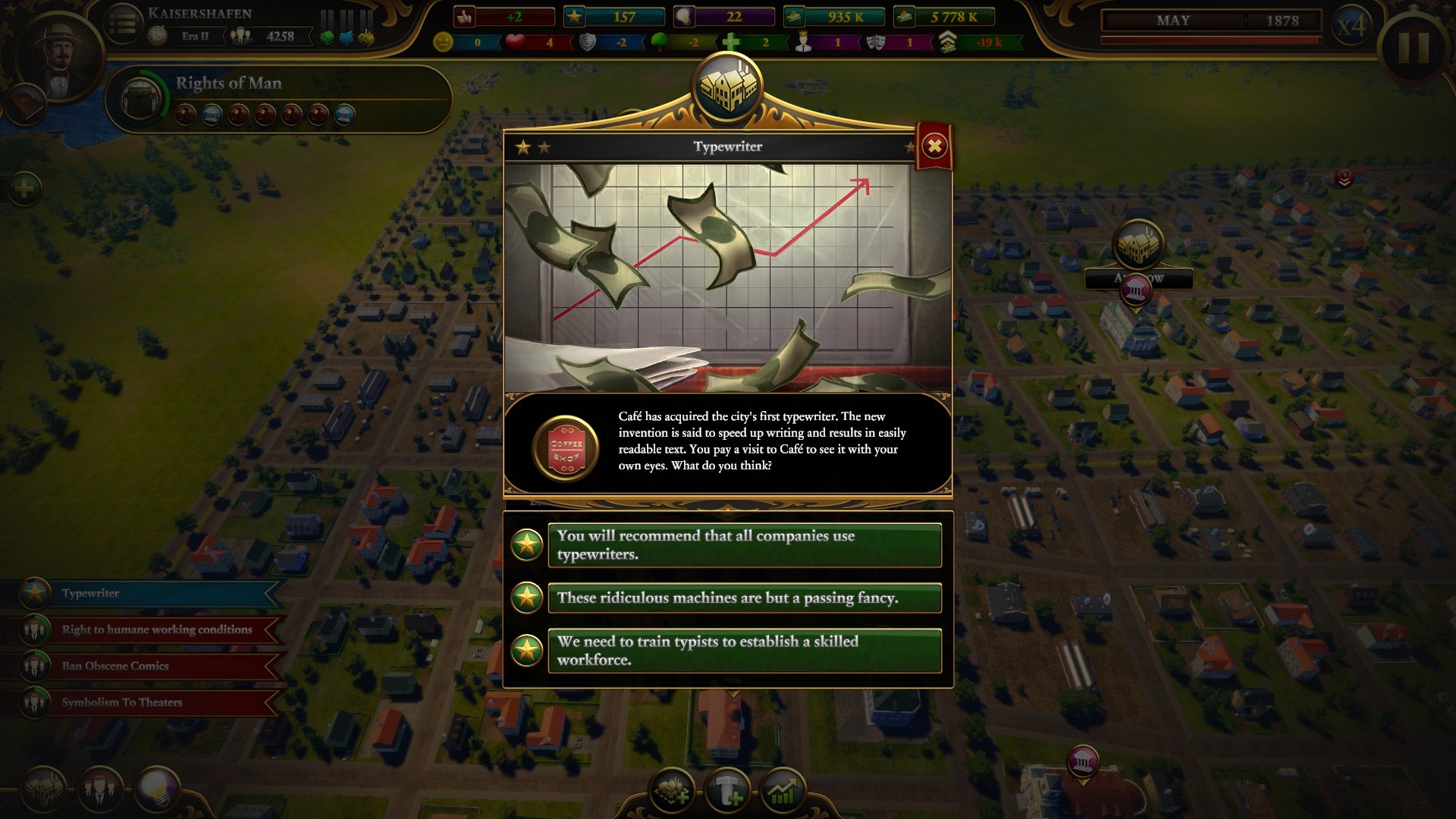Urban Empire‘s abrupt announcement and release had me very excited. A new politically-oriented strategy game published by Kalypso Media, the company that granted us the immensely charming Tropico series. Sure, Urban Empire was developed by Reborn Games — but Kalypso knows their way around politically-steeped city builders.
Now to preface all this, I didn’t go into Urban Empire expecting Tropico. You could see from streams pre-release and the trailer gameplay footage that it was nothing like the aforementioned series. This is the last time I’m going to mention it: Don’t go into Urban Empire expecting an El Presidente experience.
So what should you expect? A lot of optimization problems, a nonsensical political system that grants minimal consequences for your choices and actions, and a great deal of time staring at your town’s income rise and fall.
With a heavy heart, I have to concede that I do not recommend the purchase of Urban Empire in its current state and would even so so far as to say the game is more suited to be an Early Access title considering its current, painfully mediocre state.
The Good
Before we get to the full whinefest (like a wine festival but it won’t get you drunk), let’s go over some of the better points of Urban Empire.
A lot of people have gone into the game expecting it to be a city builder first and a political simulator second. That is not the case — politics and your characters’ growth come first, with city building itself squarely on the backburner (aside from district and service placement).
Urban Empire presents an array of political parties as you press through each era and make decisions affecting your city. These parties vote on bills and edicts in the city counsel and are present in the game’s many events. You’ll see political parties rise and fall as your character has children and raises them to succeed your rule.
Spying on and manipulating the parties in events is fun, as long as you’re paying attention to what they are, what they stand for, and so on. Reducing the power of a party that never votes toward the things you want to have approved is gratifying after finally being able to push through a bill that’s been held back time and time again.
In the game’s campaign mode you start with a single character, and as you progress you answer questions steering your character’s life and personality. This adds variety between each family you can start with. as each one has different events — and in time your first character will retire and pass the torch onto its chosen heir.
You see the effects of your life decisions more and more as you progress your lineage, which is a great personal touch to a playthrough. But like many of the game’s aspects, the effects of these choices on your gameplay are almost indiscernible. Does it really matter if people think I’m crazy for doing electrical experiments on dead bodies in my spare time? Will the public claiming my son’s mental deficiency is a punishment from God actually do anything? The answer to these questions and many more is a firm “no.”
The Bad
This is where the praise officially stops. You can see the praise slowly disintegrate above because, despite all the details put into the game, it’s all dreadfully dull and criminally half-baked. You have all these facets of the Wheel of Life (citizen needs) to deal with — but when it comes down to it, you can let your citizens wallow in squalor and raise their taxes to the sky and they will still populate your city and you will still be rolling in dough.
I don’t know how many times I’ve started a new campaign at this point. No matter the family I start with, no matter the different strategies I try (high taxes out the gate, all-mixed zones, sticking to default zones, using utility grids, not using them at all) there is minimal variety in playstyle. You’re still mostly just waiting for time to go by for the counsel to vote on the next bill and watching your city’s bank balance rise or fall, based on how heavily you tax your population (Protip: You’re going to jack their taxes sky high).
For a game that appears to have all these intricacies, Urban Empire culminates to a very vanilla and overall boring experience. No matter how many times you start a new game or how far you push into a single one and open up new gameplay aspects it all culminates to the same thing: waiting for time to go by.
Another thing to mention is that, while the game proclaims itself to be a political simulator, the clear overwhelming benefits of specific bills leaves little wriggle room in the policies of your growing town. Sure, limiting employment for citizens under 10 years old is the right thing to do — but there is no benefit to not doing so, as the bonuses you get for doing it are too good to pass up. Whether you want to or not, your rule is going to be left-leaning just to progress. And that’s a disappointment when Urban Empire‘s whole catch is its political system.
I’m not sure whether it is like this by design or because the game does not explain how to play properly. The tutorial only goes so far and it doesn’t touch on enough to give the average player the information they need to succeed. The digital manual doesn’t delve into the depths, either — you’re stuck figuring them out on your own. That would be fine and dandy if the effects of anything you did were obvious, but they’re not and often they don’t do much at all.
Having to figure out how to play a game on your own is fine with me, but not when it feels like an uphill battle just to have fun. I keep trying to enjoy Urban Empire and no matter how hard I try I keep drawing the same conclusion: “This game doesn’t feel finished.”
The Ugly
One can see the framework for a solid game in Urban Empire, but in its current state it barely passes as either a city builder or a political simulator. Instead I’d more call it a “timesink” in its truest sense, because most of what you’re doing is watching time go by and watching your counsel vote.
If your political or social choices had meaningful impacts or more obvious effects on your ruling, it would be a different story. This whole review would read very differently — but as it stands, the game feels half-finished and unrewarding.
It’s a real shame. Urban Empire‘s music really draws you in and the changes your town sees as time goes by feel good to achieve, though their luster wears off quickly when you’re still mostly just waiting for time to go by.
None of this mentions the technical issues, which are numerous at the time of writing. Reborn Games is patching the game, but the most glaring issue players at large run into is a pretty hefty memory leak that eats RAM like candy. Most players seem to run into it either a couple hours in or once they hit the third era. I myself can attest to RAM usage starting to get to be a problem around the third era and I am running a fairly new rig.
 I can’t wait to finish this era and then play the game in stop-motion.
I can’t wait to finish this era and then play the game in stop-motion.
Urban Empire has the potential to be a worthy addition to the many politically-oriented games on Steam, but as it stands it’s one option I can’t recommend. This is especially the case with its $39.99 price tag, which feels like far too much for a game that offers so little in player engagement that it seems better suited to be labeled as an in-progress Early Access title. It’s very hard to justify the cost.
While it may have the groundwork for a very compelling and deep city manager with political options, as it stands Urban Empire is not compelling nor deep — with your choices ultimately meaning very little and your mayoral political-leanings irrelevant.
Were it released as Steam Early Access title I would be willing to give Urban Empire more leeway, but to release a game in this state at such a high price point is simply ridiculous considering the staggeringly good competition in the PC space.
As it stands, it is simply too mediocre to compete with other city and political strategy games on Steam. I keep booting the game in hopes that I’ll have fun, and each and every time that fun falls on its face. I sincerely hope Reborn Games tweaks Urban Empire to be a fun and engaging strategy game, but it’s got a long road to go and with the game in a full-release state (and hefty $39.99 price) it’s hard to imagine it seeing the changes it needs soon enough to be able to stand on its own two feet.
(Full disclosure: Writer was given a review copy of Urban Empire to write this review.)









Published: Jan 24, 2017 10:22 am